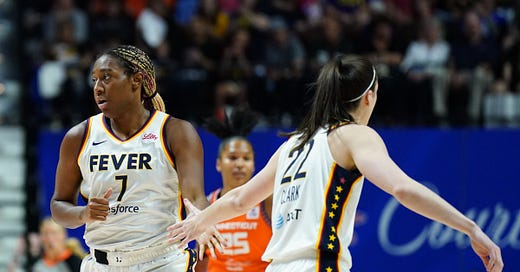Five Out: The Caitlin Clark - Aliyah Boston connection is growing, more coverage for Rickea Jackson and is the WNBA an activist league?
Vegas vibe check, a spiking Fever and the Mystics win not once but twice! Andrew's thoughts on the world of women's basketball for the week of June 17th, 2024.
I recently quit Twitter at the request of my wife. The app had successfully, for years, sucked me into a maw that I couldn’t get out of even on days when I questioned why I had it in the first place. She could see that it was making me a worse version of myself and said it might be best to take a break. They say…
Keep reading with a 7-day free trial
Subscribe to No Cap Space WBB to keep reading this post and get 7 days of free access to the full post archives.




